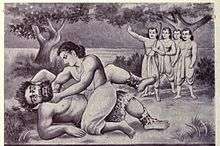Hidimba
Hiḍimbā (Sanskrit: हिडिम्बा, Hiḍimbā) is a powerful Dimasa Kachari king in the Mahābhārata.[1]
| Hiḍimbā | |
|---|---|
 Death of Hiḍimbā | |
| Devanagari | हिडिम्ब |
| Sanskrit transliteration | Hidimba |
| Affiliation | Rakshasa |
| Successor | Bhima |
| Abode | Kāmyaka Forest |
| Personal information | |
| Siblings | Hidimbi |
Temples
There are a few temples dedicated to Hiḍimbā's sister Hiḍimbī in Himachal Pradesh.
The most famous temple is the Hiḍimbā Devi Temple in Manali. Some of the sacred objects enshrined here include chariots, footprints and a small statue. Hiḍimbā is one of the most powerful deities in Kullu Valley. The pagoda-shaped wooden temple, situated in the Deodar forests, has intricately-carved wooden doors and wooden shikhara, is believed to be over 500 years old.
Festivals
Believers may travel to the town of Kullu to participate in the annual festival of Dussehra, where Hiḍimbā's chariot leads a rally of gods from all over the Kullu valley, escorting the main chariot of Raghunāth. At the end of the seven-day festivities, on the "Lanka Dahan" day, sacrifices are made to Hiḍimbā. Ghaṭotkaca is also a popular deity in the neighboring Banjar village and Siraj district.
See also
References
- HimVani, Team (28 March 2007). "Hidimba: The unsung heroine of Mahabharata". HimVani. Retrieved 3 July 2019.

